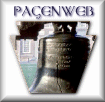Allegheny County, Pennsylvania
USGenWeb® Project
(Family History and Genealogy)
Chapter IV Snowden Township Snowden Township was named for John M. Snowden, an associate lay judge. October 2, 1844, Stephen Woods, Col. John Neel and John Brawdy were appointed by the court to consider the propriety of forming a new
township from parts of Jefferson and Upper St. Clair. A favorable report having been rendered, the proposed territory (12,240 acres, 7,741
acres from Upper St. Clair and 5,499 acres from Jefferson) was formally erected into the new township of Snowden October 6, 1845. The first settler within the township as thus constituted was Oliver Miller, who is said to have made some improvements on a branch
of Peter’s creek in 1762. The first birth in the township was that of his son James, March 29, 1763. The family was several times obliged
to fly for safety to the forts on the Monongahela. The families of Wilson, Larmer, Logan, Kirkendall and Nye were also early represented. John M. Snowden, in whose honor the township is named, was associate lay judge of the county from 1840 to 1845. He was born at Philadelphia,
and after learning the trade of a printer, removed to Greensburg in 1798, where he established the Farmers’ Register, this being the
second journalistic venture in Western Pennsylvania. He removed to Pittsburgh in 1811, where he published the Commonwealth and Mercury.
He was mayor of the city at various times, county recorder, director of the Bank of Pittsburgh, and was widely known as a leading citizen
of the county. He died suddenly April 2, 1845, in the second term of his judicial incumbency. The population in 1860 was 1,367; in 1870, 1,258; in 1880, 1,259. These figures include the population in the present territory of Bethel.
The Baltimore & Ohio Short Line railroad passes through the eastern part of Snowden, but there is neither station, village, postoffice nor church within its limits.
![]()


